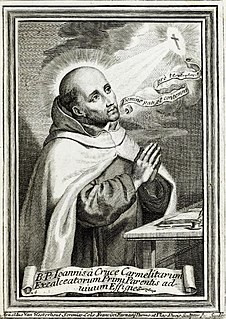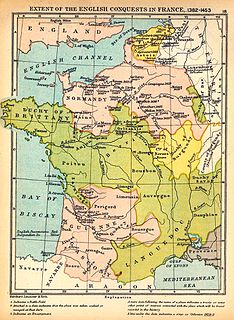Related Research Articles

Edward the Confessor was one of the last Anglo-Saxon kings of England. Usually considered the last king of the House of Wessex, he ruled from 1042 to 1066.

John of the Cross, venerated as Saint John of the Cross, was a Spanish Catholic priest, mystic, and a Carmelite friar of converso origin. He is a major figure of the Counter-Reformation in Spain, and he is one of the thirty-six Doctors of the Church.

John of Gaunt was an English prince, military leader, and statesman. He was the third of the five sons of King Edward III of England who survived to adulthood. Due to his royal origin, advantageous marriages, and some generous land grants, Gaunt was one of the richest men of his era, and was an influential figure during the reigns of both his father, Edward, and his nephew, Richard II. As Duke of Lancaster, he is the founder of the royal House of Lancaster, whose members would ascend to the throne after his death. His birthplace, Ghent, corrupted into English as Gaunt, was the origin for his name. When he became unpopular later in life, a scurrilous rumour circulated, along with lampoons, claiming that he was actually the son of a Ghent butcher. This rumour, which infuriated him, may have been inspired by the fact that Edward III had not been present at his birth.

John Badby (1380–1410), one of the early Lollard martyrs, was a tailor in the west Midlands, and was condemned by the Worcester diocesan court for his denial of transubstantiation.

John Leland or Leyland was an English poet and antiquary.
Thomas Walsingham was an English chronicler, and is the source of much of the knowledge of the reigns of Richard II, Henry IV and Henry V, and the careers of John Wycliff and Wat Tyler.

Thomas of Woodstock, 1st Duke of Gloucester was the fifth surviving son and youngest child of King Edward III of England and Philippa of Hainault.

Sir Thomas Erpingham was an English knight and administrator of the Kingdom of England. He served three generations under the House of Lancaster, and his military career spanned four decades. He would later rise to national prominence and would go on to acquire great wealth and influence through his access to royal patronage.
Henry Yevele was the most prolific and successful master mason active in late medieval England. The first document relating to him is dated 3 December 1353, when he purchased the freedom of London. In February 1356 he was sufficiently well known as a mason that he was chosen as one of a commission of six cutting masons who were to inform the mayor and aldermen about the acts and articles of the craft.

Felix of Burgundy, also known as Felix of Dunwich, was a saint and the first bishop of the East Angles. He is widely credited as the man who introduced Christianity to the kingdom of East Anglia. Almost all that is known about the saint originates from The Ecclesiastical History of the English People, completed by Bede in about 731, and the Anglo-Saxon Chronicle. Bede praised Felix for delivering "all the province of East Anglia from long-standing unrighteousness and unhappiness".
Ipswich Whitefriars was the medieval religious house of Carmelite friars which formerly stood near the centre of the town of Ipswich, the county town of Suffolk, UK. It was the last of the three principal friaries to be founded in Ipswich, the first being the Ipswich Greyfriars (Franciscans), under Tibetot family patronage before 1236, and the second the Ipswich Blackfriars (Dominicans) founded by King Henry III in 1263. The house of the Carmelite Order of White Friars was established in c. 1278–79. In its heyday it was the home of many eminent scholars, supplied several Provincial superiors of the Order in England, and was repeatedly host to the provincial chapters of the Order.

William Ufford, 2nd Earl of Suffolk was an English nobleman in the reigns of Edward III and Richard II. He was the son of Robert Ufford, who was created Earl of Suffolk by Edward III in 1337. William had three older brothers who all predeceased him, and in 1369 he succeeded his father.
John Ashwardby was a follower of John Wycliffe.
William Gregory, was a Scottish Carmelite.

Despenser's Crusade was a military expedition led by the English bishop Henry le Despenser in 1383 that aimed to assist the city of Ghent in its struggle against the supporters of Antipope Clement VII. It took place during the great Papal schism and the Hundred Years' War between England and France. While France supported Clement, whose court was based in Avignon, the English supported Pope Urban VI in Rome.
Robert Baston, was an English Carmelite friar and prior of the abbey of Scarborough.
John Bate was an English or Welsh theologian and philosopher.
John Batmanson, was prior of the Charterhouse in London.
William Beckley was an English Carmelite.
Nicholas Bayard was a Dominican theologian.
References
- ↑ (Bale, Heliades, Harley MSS. 3838, 2, 67)
. Dictionary of National Biography . London: Smith, Elder & Co. 1885–1900.